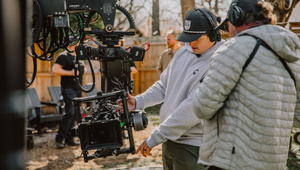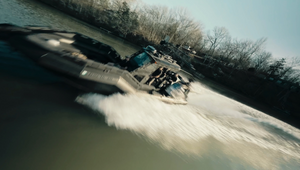
Ashley Geisheker on Using AI, Unreal Engine and Dynamite for Epic Productions

Nashville-based production company Gear Seven pushes the limits of creativity, technology and possibility - and innovates like it’s nobody's business. Alongside a non-exclusive roster of directors and production capabilities, Gear Seven offers hardware, LED volume studios and virtual production via its sister companies Shift Dynamics and Arc Studios.
Gear Seven has teamed up with LBB to speak with agency production leaders about innovations in production technology and how it’s revolutionising commercial production. This series investigates the importance of education in this area for agencies and brands and offers a fun opportunity to nerd out on all things technical, while sharing memories of their most awe-inspiring and unforgettable moments on set.
The latest interview is with Ashley Geisheker, EVP, head of production at ad agency Leo Burnett. Since joining the company in 2018, she has overseen and produced Emmy-nominated, Black Pencil-awarded and Titanium Lion-winning work, like ‘The Lost Class’, for clients including the Bank of America, Samsung and Nintendo. Ashley also boasts significant production experience in previous roles, namely as a production executive for VSA Partners, executive producer at Cavalry and in other production roles at agencies such as Y&R and Energy BBDO.
Speaking to LBB’s Ben Conway, Ashley discusses her experiences with production technology, including how she’s utilised drones, real-time game engines and virtual production to engage in “culturally significant moments” for brands.
LBB> Throughout your career – what has been the most exciting or groundbreaking piece of new kit or technology that was introduced to you and why?
Ashley> In my early days of production, I produced quite a few adventure-esque pieces that required aerial shots, all filmed from a helicopter using a Cineflex system. There is just something inherently amazing about being able to capture those crystal-clear sweeping shots from up in the air. Later, we started also utilising drones to capture some of the footage, which also blew my mind when they first came out.
LBB> And what are the technologies that you have your eye on now that either are having a big impact on how production is done - or have the potential to change things in a big way?
Ashley> Like everyone else, AI is top of mind. The breadth of possibilities is as nerve-wracking as it is invigorating. It has the potential to completely reshape the landscape of not only our creative development process, but also how we approach production. How we’re able to leverage AI, from the early stages of concept development, all the way to how we redefine what constitutes talent, is going to completely transform production.
It’s thrilling to be part of the industry while this technology is still in its infancy, and we can shape how it's utilised for our benefit.
LBB> Can you talk us through one or two of the most exciting recent productions that you’ve been involved in that you think had a really interesting innovation or technological aspect to them?
Ashley> We’ve recently been leveraging Unreal Engine to bring different characters to life on a myriad of platforms. The post-production process is streamlined, and the quality is fantastic. We are also now able to take our characters to streaming platforms and react in real-time, which has not previously been possible. It modernises how we bring work into the world and also allows us to immediately engage in culturally significant moments, so we’re part of the conversation from the start.
LBB> What is the time in your career that you’ve been on set or observing a production and been particularly in awe of what the production team was pulling off?
Ashley> The productions I referenced earlier with the heli shots. While it wasn’t the most technologically advanced production I’ve been a part of, it was still epic. The production had it all – small-town Alaskan inns, specially trained people iceberg jumping, glacier calving, explosion efforts dropping dynamite to simulate an avalanche, and a safety meeting that involved a knife and an apple.
LBB> Virtual production is also growing in popularity in film and TV - what are your thoughts about its potential in the advertising space?
Ashley> We’ve used it on a few brands at the agency to date with great success. It offers a lot of flexibility when we’ve needed to capture a range of assets that will need to continually be updated for future use. It’s another tool we should all be exploring. While it is not necessarily the solution for every production, when used for the right creative, it creates a world of flexibility.
LBB> It can involve quite a different workflow/process - is that something you feel agencies and brands need to educate themselves on or does it lie with the production company? Why?
Ashley> Knowledge is power. Everyone should be part of the conversation and learn as much as possible when it comes to the possibilities of virtual production. Producers need to understand the pros and cons of the technology to then be able to better inform the team during the creative development process on how it can be an asset.
While production companies are at the forefront of the technology and aware of how it can be woven into the process, it’s the partnership between them and the agencies and brands on the evolution of what is possible that will be the key to its success.
LBB> With so many platforms to produce for, what’s your preference: to maximise assets across platforms or to produce content that’s more tailored to each one? Or some sort of balance, perhaps?
Ashley> Balance. Creative should be made to fit the platform and tailored to how the audience is going to react to it. But it’s also critical to be mindful of every piece that is needed and to build a production system that leverages different assets to be time and cost-efficient. When doing so, you’re also creating a universe for the idea where everything works together cohesively.
LBB> Quite often, production involves trying to solve a problem that’s never been attempted before - and that can mean hacking existing technology or trying to find new technologies. When you get a project that has such technological challenges, how do you and your team like to approach them?
Ashley> These are the exciting projects and the team approaches them head-on. The Leo Burnett production department is focused on being the craft makers who find ways to execute ideas that have never been done before. We love to get our hands dirty early in the creative development process so we can start hunting for the best way to crack a problem.















